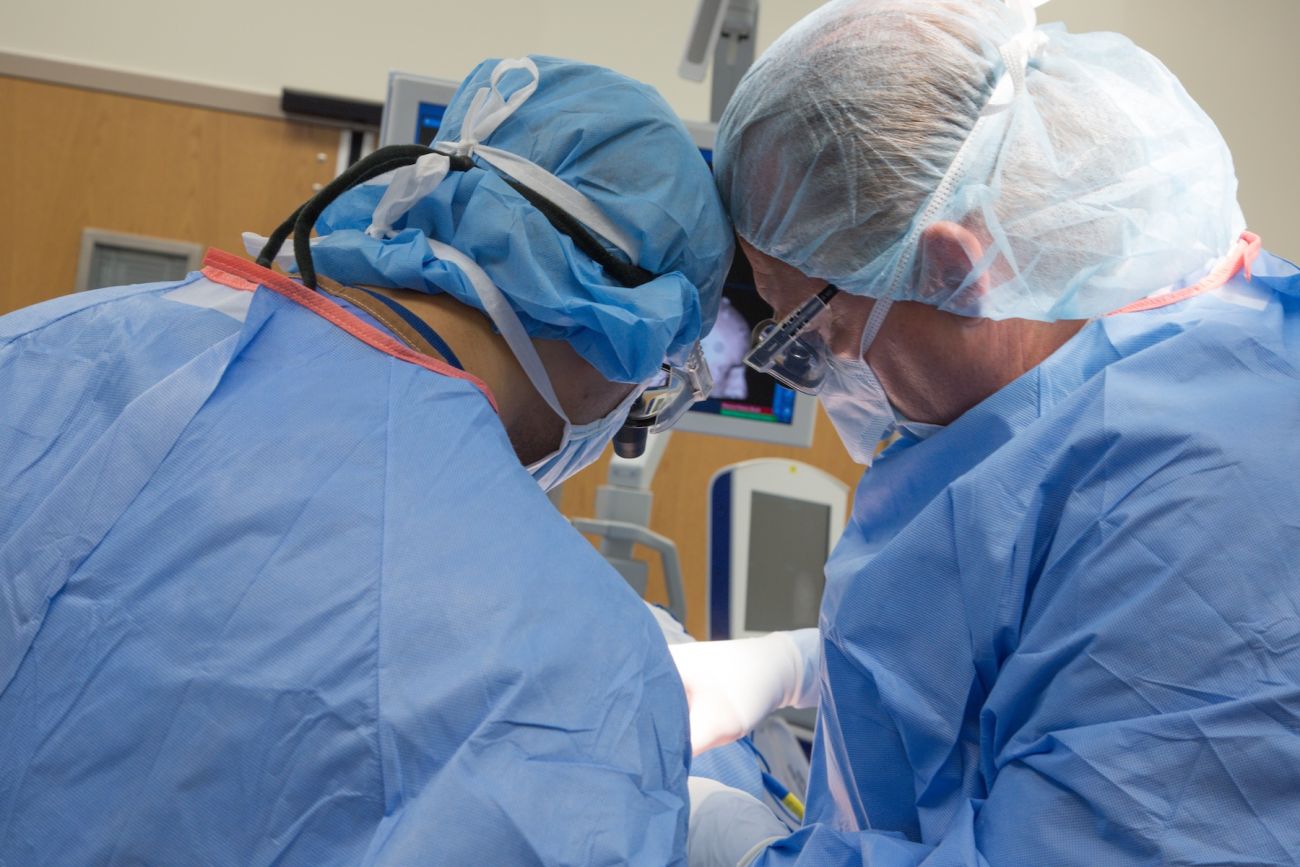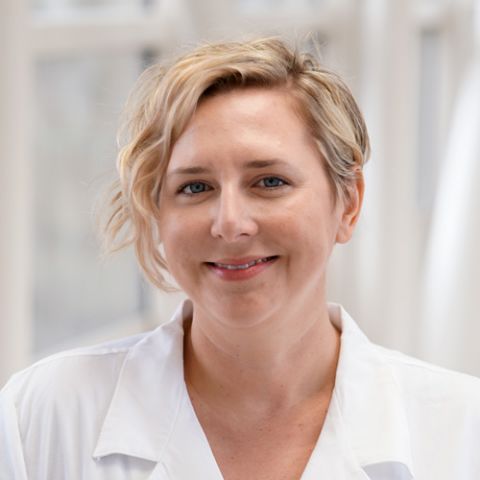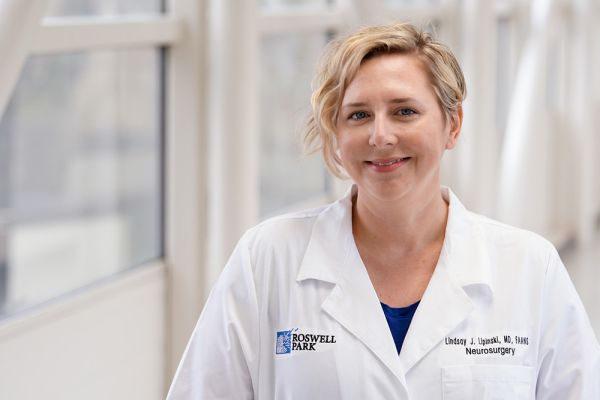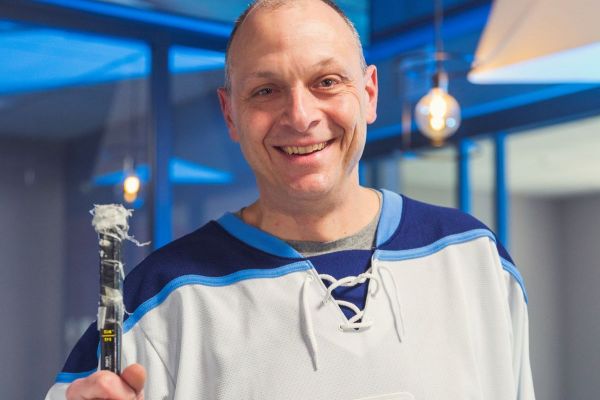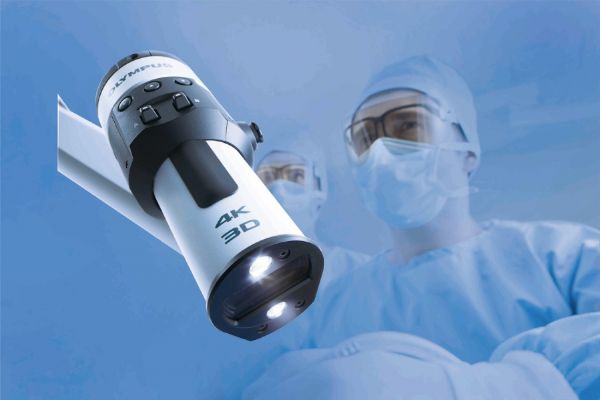When Jenny Bagen, a nurse practitioner in private practice, tested positive for COVID-19 in December 2021, she began to experience severe headaches. Eventually a CT scan revealed a frightening image: “I was told I had a big tumor on my brain,” she says. “My frontal lobe was starting to buckle. I was scared to death.”
Fortunately, the tumor was benign — as are many brain tumors. But hers grew over time, and by last October, neurosurgeon Lindsay Lipinski, MD, at Roswell Park Comprehensive Cancer Center, recommended its removal. “Because the skull is a fixed volume, a large tumor can put pressure on the brain. There is no space for the brain to move,” Dr. Lipinski says. “It can create irritation in the brain surrounding the tumor even if it’s not cancerous, so depending on its size and location, it may make sense to remove it before it causes problems.”
Bagen was told that if her tumor was not removed, she would be at risk for stroke-like symptoms and seizures. “I thought, I need to go forward with this,” Bagen says.
Learning what to expect after the surgery can help ease your anxiety. Full recovery from craniotomy is different for every person, but usually takes eight to 12 weeks.
How will I feel afterward?
Every case is different, but symptoms after surgery are usually related to the ones experienced prior to surgery, explains Dr. Lipinski. “For example, if you had weakness or numbness, it may be the same or worse immediately after, but we expect that that will be temporary. Some people have improvement of their neurologic symptoms immediately after surgery.”
Most patients don’t experience a lot of pain, except for discomfort at the incision site, which is managed with oral medications. “You may feel headachy, but it is a low-level pain that tends to get better pretty quickly,” Dr. Lipinski says. “The biggest complaint typically is fatigue. Patients find it takes weeks to months to get back to their baseline energy level. That also gradually improves over time.”
Bagen, who had surgery on February 9, says it was nothing like what she expected. “I expected the worst,” she says. Her only symptoms were a reaction to medication she took for the pain. “That was making me sick. Once off that, I was able to resume with just Tylenol.” Her hospital stay was just five days.
Will I have issues with walking, talking or thinking?
Dr. Lipinski generally tells patients to take it easy after surgery. “For the first month, I ask that you not do any heavy lifting or vigorous exercise that raises your heart rate or causes you to strain,” she advises. “No aerobic exercise, no lifting anything over 10 pounds, which is about a gallon of milk. Also, no bending so that your head is lower than the level of your heart.” Gentle walking is encouraged: “By the second month, you can slowly increase activity to low-impact cardiovascular exercise and lifting up to 20 pounds.
The goal is to get you back to everything you want to do by three months,” she says, adding that the one exception is recovering stamina. Fatigue can take anywhere from three to nine months before you’re at full energy level. It can be a long process, so patience is important.
In most circumstances, patients do not have cognitive or speech difficulty. “It depends on the location of the tumor and symptoms coming into surgery,” says Dr. Lipinski. “If speech was difficult before surgery, it may temporarily get worse, and we expect it to get better in time. Or it may improve immediately.”
What will be the biggest challenge?
For Bagen, her biggest obstacle was recovering from fatigue. “I am finally starting to be able to get out. I can drive now. I’m getting better,” she says. Other short-term challenges can include some pain, headaches and loss of focus or concentration, particularly when using computer or phone screens. There may also be some scalp numbness around the surgical site, which usually gets better with time but, in some cases, can be permanent.
Why Roswell Park for brain surgery?
“We believe in a multidisciplinary care model using an expansive team that addresses all facets of care for any brain tumor,” Dr. Lipinski says. That team includes neurosurgeons, medical and radiation oncologists, specialty nurses, physical and occupational therapists and others who know how to help patients recover in the most efficient way and meet recovery goals. “Cases are reviewed by the team’s tumor board to create an individualized treatment plan with the patient’s specific goals and needs in mind,” says Dr. Lipinski.
Bagen says the most important thing is having a physician who spends time with you and tells you exactly what to expect so you can make informed decisions. She credits Dr. Lipinski and the entire Roswell Park care team for making her story, “a success story.”
Get a second opinion
Even if you received your diagnosis in an emergency room or are currently admitted in another hospital, you have time for a second opinion. We can arrange for Roswell Park's brain tumor experts to review your imaging and set up a consultation with our neuro-oncology team.
Editor’s Note: Cancer patient outcomes and experiences may vary, even for those with the same type of cancer. An individual patient’s story should not be used as a prediction of how another patient will respond to treatment. Roswell Park is transparent about the survival rates of our patients as compared to national standards, and provides this information, when available, within the cancer type sections of this website.
